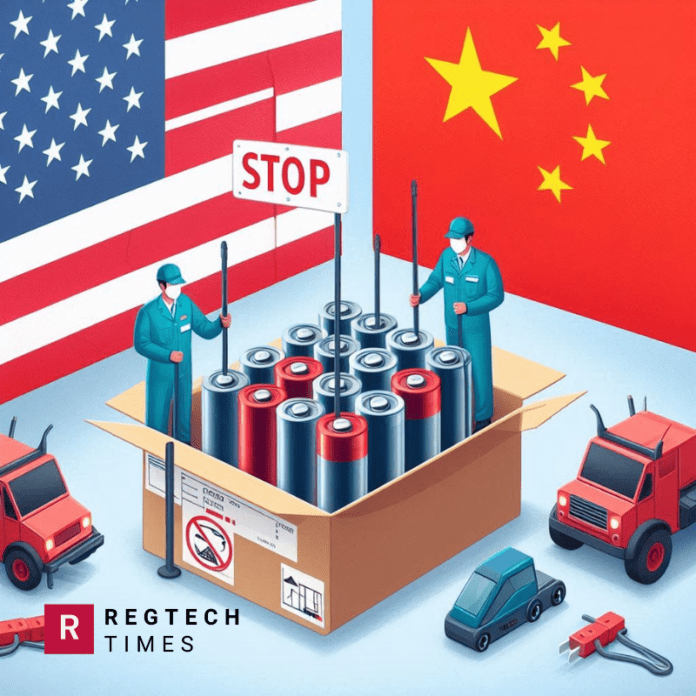A group of Republican lawmakers is calling for the ban of two leading Chinese battery companies, Contemporary Amperex Technology (CATL) and Gotion High-Tech, from shipping goods to the U.S.
These companies, which have ties to major automakers Ford Motor and Volkswagen, are alleged to be using forced labour in their supply chains. The lawmakers have sent letters to the Biden administration, requesting immediate action under the Uyghur Forced Labor Prevention Act.
Uyghur Forced Labor Prevention Act
The lawmakers’ letters, addressed to Department of Homeland Security Undersecretary Robert Silvers, urge the addition of CATL and Gotion to the import ban list. This list managed under the Uyghur Forced Labor Prevention Act, aims to prevent goods made with forced labor from entering the U.S. market.
The Uyghur Forced Labor Prevention Act is a significant piece of U.S. legislation aimed at combating human rights abuses in China’s Xinjiang region. Enacted to address the widespread reports of forced labor among the Uyghur Muslim population and other ethnic minorities, the Act effectively bans the import of goods produced in Xinjiang unless companies can prove that their supply chains are free from forced labor.
Rebranding Tactics of Chinese Companies: Deceptively Camouflage as US Entities to Evade Sanctions
This legislation reflects the U.S. government’s commitment to upholding human rights and ethical trade practices, and it places stringent requirements on businesses to ensure transparency and compliance. The Act is part of broader efforts to pressure China to end its alleged exploitation and mistreatment of Uyghurs, thereby promoting accountability and protecting vulnerable populations from labor abuses.
The letters were signed by prominent figures including Rep. John Moolenaar, Rep. Mark Green, and Sen. Marco Rubio.
After the AI Chips Restrictions now the US Lawmakers are looking at Restricting the Chinese Battery Makers.
Companies’ Responses
CATL, the world’s largest maker of Chinese Batteries for Electric Vehicles, has denied the allegations. A spokesperson for the company stated, “Any suggestion that CATL has used forced labor, or has any connection to forced labor, is absolutely false.” Despite the accusations, neither Gotion, Ford, nor Volkswagen have responded to requests for comment.
Impact on U.S. Expansion Efforts
The push for action against CATL and Gotion complicates their efforts to establish a presence in the U.S. Both Chinese battery makers have faced scrutiny as they attempt to expand their operations stateside, amidst a broader push for the adoption of electric vehicles in the U.S. and other countries.
China Retaliates: Imposes Sanctions on Lockheed Martin and other US Defense Companies
CATL’s U.S. Ventures
CATL licenses its technology to Ford, which had initially planned to build a $3.5 billion battery plant in Michigan using CATL technology. However, after Republican-led committees began investigations, Ford paused and scaled back these plans. Lawmakers argue that such projects could lead to Chinese dominance in the U.S. auto industry.
EV Tariffs Loom : German Automakers Fear 25% Chinese Retaliation
Gotion, partially owned by Volkswagen, also plans to build a factory in Michigan. However, this project has similarly faced intense scrutiny. Being added to the entity list would pose a significant hurdle for both companies’ aspirations in the U.S. market.
Chinese Battery Business Related Entity List
The entity list, managed by the Department of Homeland Security, identifies businesses believed to be involved in forced labor from China’s Xinjiang region. This region is home to the Uyghur people and other minority groups, and the U.S. has effectively banned the import of all goods linked to Xinjiang under the Uyghur Forced Labor Prevention Act.
Under the Uyghur Forced Labor Prevention Act, the entity list is a critical tool. By flagging these Chinese Battery Manufacturers in the entity list will help US to prevent the importation of Chinese Battery products produced through exploitative labor practices into the United States.
The lawmakers assert that CATL’s and Gotion’s supply chains are compromised due to their links to Xinjiang. They specifically point to connections with the Xinjiang Production and Construction Corps (XPCC), a paramilitary organization that the U.S. has sanctioned and added to the entity list. China, however, has consistently denied any human rights abuses in the region. There is no direct connection between the Chinese Battery Makers and the XPCC.
China Sanctions Ex-US Legislator Mike Gallagher who Exposed Dangerous CCP Plot in 2024
Volkswagen’s Experience
Volkswagen has faced similar challenges, with some of its vehicles being held up at U.S. ports due to components sourced from companies on the entity list. The automaker has also faced repeated criticism for its factory in Xinjiang, which it operates jointly with a Chinese state-owned company.
A spokesperson for the Department of Homeland Security stated that the department responds directly to Congressional letters and will continue to do so appropriately. This indicates ongoing governmental scrutiny and potential action against Chinese Battery Makers linked to forced labor practices.
The allegations against CATL and Gotion highlight the ongoing tension between economic ambitions and ethical practices. As the U.S. continues to push for the adoption of electric vehicles, ensuring that supply chains particularly the Chinese Battery Products are free from forced labor remains a critical concern. The outcome of these allegations and the subsequent actions by the U.S. government will likely have significant implications for the future of these Chinese battery giants in the American market.


